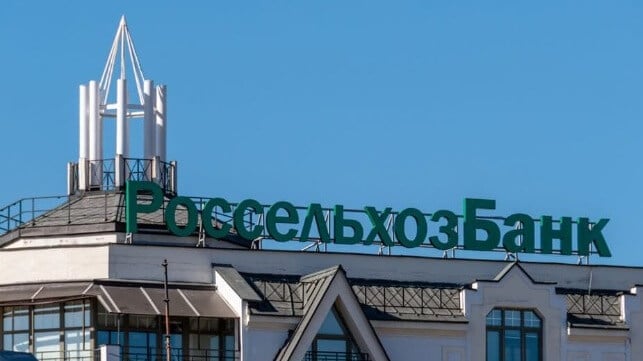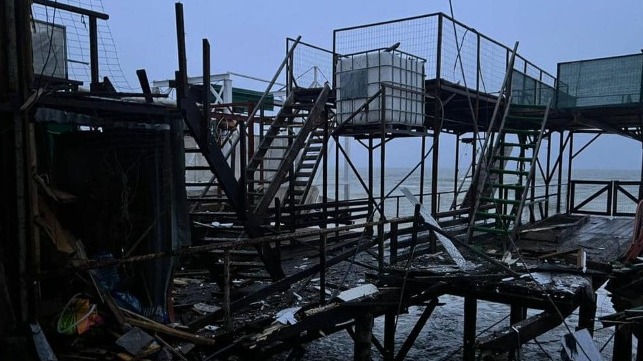TRUMP ABANDONS UKRAINE & NATO
U.S. Agrees to Help Russia Increase Ag Exports, Lift Bank Restrictions

Russia and the United States have agreed to the outlines of a tentative ceasefire deal in the Black Sea, allowing most combat on shore in Ukraine to continue. The contours of the agreement largely align with past Russian demands, and Ukrainian leaders said that they would watch Moscow's compliance closely in the days to come.
According to the Kremlin, the agreement must allow state-owned Russian Agricultural Bank (Rosselkhozbank) to relink to the international SWIFT bank messaging system, a key demand of Russian negotiators since at least 2023. The bank is under EU, UK and U.S. sanctions, and the agreement would require participation from European regulators to reconnect it to SWIFT.
The U.S. has agreed to help Russia restore its "access to the world market for agricultural and fertilizer exports," according to a White House readout, including ports, "payment systems," and reduced maritime insurance costs. The White House did not describe any clear benefits for Ukraine.
After the announcement, Ukraine's defense minister said that the success of the deal requires Russia to keep its military vessels in the eastern half of the Black Sea, continuing the status quo. Ukraine's military has damaged, destroyed or sunk about one third of the Russian Black Sea Fleet using missiles and drones, and as a practical matter, Russia's surviving warships have been largely confined to the safety of the eastern half the sea since last year. If the Russian Navy uses the ceasefire to transit near Ukraine's shores again, Ukraine will have "full right to exercise right to self-defense," said Ukrainian defense minister Rustem Umerov.
The three sides are still working out the details of the deal, along with a parallel agreement to stop attacks on "energy infrastructure." Russia has had considerable success in destroying Ukraine's electrical grid with drones and missiles; for its part, Ukraine has been making strides in long-range suicide drone technology, and has been targeting oil refineries and pipelines deep within Russian territory. In talks with the White House last week, Russian President Vladimir Putin secured a U.S. agreement for an energy infrastructure ceasefire, which would allow Russia's refining industry time to recover from the damage.
Long-range sea drone and aerial drone attacks have been Ukraine's primary areas of success in the conflict over the past year, and these operations would cease under the twin agreements. Russia has gained a strong upper hand in front-line ground combat, which was not addressed in the talks and will continue as before. Even though the deal favors Russia's comparative military strengths, Ukrainian leaders expressed little certainty that the Kremlin would adhere to the terms.
"The behavior of the Russian Federation in the coming days will show a lot, if not everything," said Ukrainian President Volodymyr Zelensky. "If there are air alarms again, if there is military activity in the Black Sea again, if there are Russian manipulations and threats again, then we will have to take new measures - specifically against Moscow."
The details remain under discussion, and a full-spectrum pause in the fighting appears unlikely in the near term. Russian diplomats told The Moscow Times this week that the Kremlin's negotiators have been instructed to stall for time in meetings with the U.S. side so that Russian troops can continue to take more Ukrainian territory. "These guys know the Ukraine talks inside and out. They’ve been tasked with nitpicking every comma," one source told Moscow Times. In an interview Tuesday, President Trump acknowledged the possibility that Russian negotiators could be "dragging their feet," and noted that he had used stalling tactics himself earlier in his business career.
"Things are unfolding more according to Russia’s scenario. Whether this [Black Sea limited ceasefire] will happen is still unclear,” Fyodor Lukyanov, a prominent pro-Russian journal editor, told Moscow Times. "But even if it’s implemented, it won’t directly change the situation on the battlefield, where the initiative currently belongs to Russia."
U.S.-Russian Talks on Black Sea Ceasefire Wrap Up in Riyadh

U.S. and Russian negotiators have wrapped up their first day of talks on a Black Sea ceasefire, according to Russian media. The Saudi-hosted conversation in Riyadh lasted 12 hours, and the details of the results should be released tomorrow in a joint statement. Diplomats from most Black Sea nations were not present, but Ukrainian representatives gave their input to the U.S. delegation on Sunday and were on hand nearby for consultation on Monday.
The outlines of a ceasefire deal have begun to emerge, though so far it appears that most hostilities will be allowed to continue on shore, where Russia is making steady gains on the front line. On the ground, the ceasefire solely covers attacks on "energy infrastructure," leaving ports and railways unprotected despite a Ukrainian proposal to include them. The details of the Black Sea ceasefire will likely be known Tuesday. Steve Witkoff, Trump's envoy to Russia and Ukraine, spoke optimistically about the talks and told reporters there were signs of "real progress."
Bulgarian and Romanian diplomats have expressed unease, according to the FT, as any deal is likely to provide a new military advantage to Russia after a year of comparatively peaceful navigation in the western Black Sea. Recent Russian attacks on Odesa have killed as many seafarers as the last year of Houthi violence in the Red Sea, but merchant vessels have recently enjoyed unhindered access to the ports of NATO's member states in the region (Turkey, Bulgaria and Romania). This was not always so: until Ukraine's missiles and suicide drone boats drove the Russian Navy out of the western Black Sea, mines and missile attacks were a near-constant threat.
In three years, Ukraine has yet to attack a foreign merchant ship in the Black Sea, though it has struck several civilian-crewed, Russian-flagged vessels used for military logistics. It has focused instead on the Russian Black Sea Fleet, and so far it has damaged, disabled or sunk about one third of the Russian Navy's warships in the region, including the fleet flagship Moskva and the Kilo-class attack sub Rostov-on-Don. The remainder of the fleet has been withdrawn to the relative safety of Novorossiysk and the northeastern Black Sea - but it c
No comments:
Post a Comment